Was this divorced American diva the original Meghan Markle? The REAL story of the most divisive person to ever marry into the royal family…
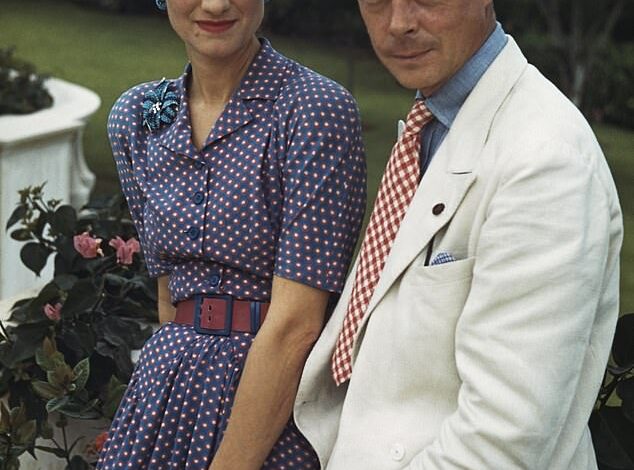
An American divorcee. A dazzling wardrobe. A royal romance that ends in exile. Denied the use of her HRH title, accused of corrupting a prince, cast as a threat to the very survival of the British monarchy and relentlessly vilified by the press.
No, not Meghan Markle – but you’d be forgiven for thinking so.
Eight decades before Meghan even arrived on the scene, Wallis Simpson, Duchess of Windsor, twice divorced and hailed as the embodiment of 20th-century chic, scandalized the British establishment – and became a lightning rod for criticism in much the same way that the next American divorcee-turned-duchess is today.
Now, the woman who triggered King Edward VIII’s abdication is at the center of a new dramatic biopic, The Bitter End, directed by Mike Newell and starring Dame Joan Collins that is about to grace our screens.
From one dynasty to another, Collins is set to make the bold transformation from acting royalty to British royalty – and, in doing so, will shine a light on the tragic and largely untold tale of the final years that the Duchess spent under the coercive control of her sinister French lawyer, Suzanne Blum.
With Blum played by another bona fide member of Hollywood royalty, Isabella Rossellini, this is a legends playing legends setup for what Collins says is an opportunity to tell the ‘true story’ of an iconic yet elusive woman.
Collins, no stranger to press intrusion herself, claims that she has been lured out of acting retirement to redress how we understand this complicated figure – described by her ghostwriter Charles J.V. Murphy as ‘brisk, businesslike’ and without question ‘a woman of strong will and determination’.
‘I’ve always been fascinated by Wallis,’ Collins has said, ‘because I think she was unfairly treated.’
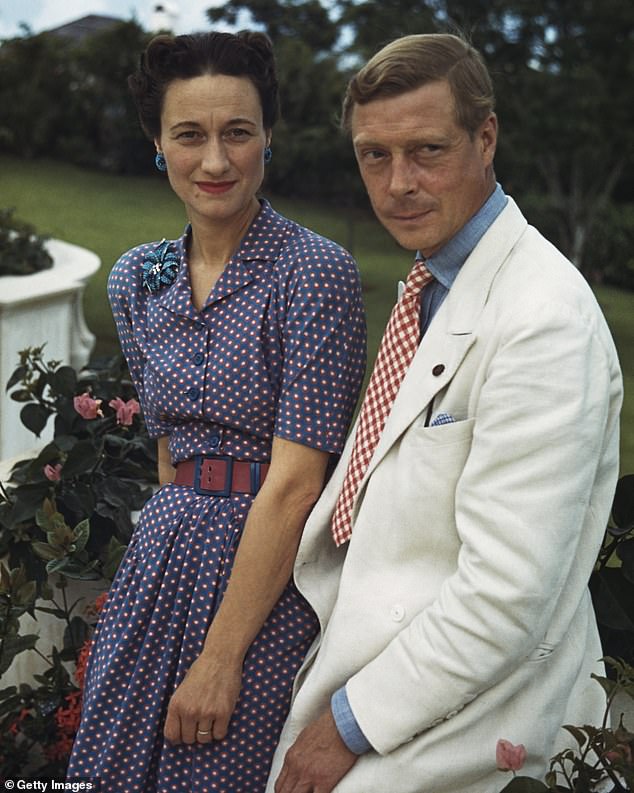
Decades before Meghan arrived on the scene, Wallis Simpson (pictured with the Duke of Windsor in 1942), Duchess of Windsor, twice divorced and hailed as the embodiment of 20th-century chic, scandalized the British establishment – and became a lightning rod for criticism.
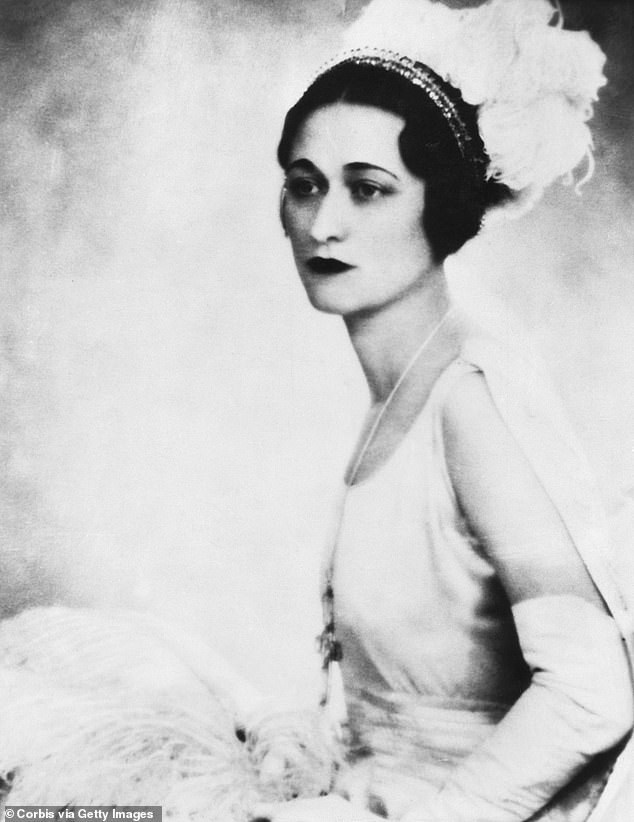
Now, Wallis Simpson (depicted here in a portrait from the 1920s), the woman who triggered King Edward VIII’s abdication is at the center of a new dramatic biopic, The Bitter End, directed by Mike Newell and starring Dame Joan Collins that is about to grace our screens.
The Duchess would have certainly concurred. ‘Not one break was I given in the whole thing,’ she told Murphy in the fall of 1954, discussing her treatment by the press following the abdication. ‘Everybody just got out their whips and lashed.
‘I don’t think anybody ever tried to put themselves in my position… It’s as though I committed some horrible murder.’
Her memoir, A Heart Has Its Reasons, published in 1956, tried to offer a more empathetic and, indeed, sympathetic take on her story – but little headway was achieved, either in her lifetime or beyond.
The publication, though, can be seen as a concerted but failed attempt to reclaim her truth – a forebear perhaps of Meghan’s Oprah interview, Netflix series and Harry’s memoir, Spare.
But, according to Johanna Schutz, the Windsors’ private secretary for eight years and one of the last people to have known the couple intimately, there is no comparison between the two duchesses.
In an exclusive interview with Anna Pasternak, the royal biographer and author of The American Duchess: The Real Wallis Simpson, Schutz dismissed the notion, saying: ‘Meghan doesn’t come close to the Duchess in terms of style and sophistication.’
Pasternak, too, seems unconvinced, having written persuasively that Wallis desperately wanted Edward to stay in the royal family, unlike Meghan who seems to have made every possible effort to take Prince Harry out.
Her book offers a more sympathetic portrayal of the Duchess of Windsor than traditional narratives, which is what I had hoped the new film would also attempt to achieve.

In an exclusive interview with Anna Pasternak, the royal biographer and author of The American Duchess: The Real Wallis Simpson, Schutz dismissed the notion, saying: ‘Meghan doesn’t come close to the Duchess in terms of style and sophistication.’
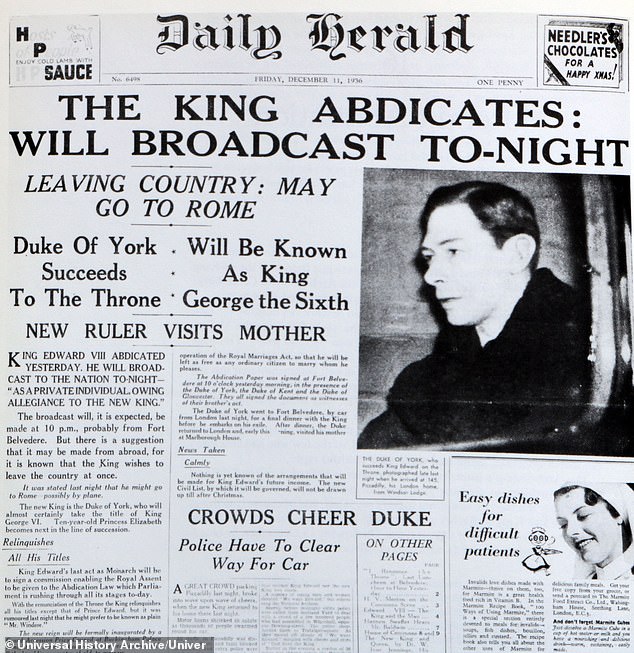
‘Not one break was I given in the whole thing,’ Wallis Simpson told her ghostwriter Charles J.V. Murphy in the fall of 1954, discussing her treatment by the press following the abdication. ‘Everybody just got out their whips and lashed.
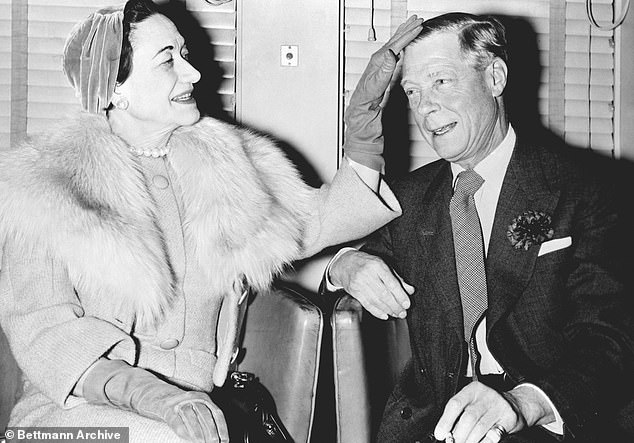
Wallis’s memoir, A Heart Has Its Reasons, published in 1956, tried to offer a more empathetic and, indeed, sympathetic take on her story – but little headway was achieved, either in her lifetime or beyond. (Pictured The Duke and Duchess of Windsor in 1958).
Though few details about the upcoming drama are known, any optimism I might have had about the historical integrity of the latest on screen depiction of Wallis Simpson is fading.
If the recently released film still is anything to go by, caricature, exaggeration and even a degree of camp – all ubiquitous elements of previous portrayals of the Duchess – seem to be on the horizon in this new cinematic salvo.
Standing in the garden of what one assumes to be the recently renamed ‘Villa Windsor’, the 19th-century mansion on the outskirts of Paris that was in the Duke and Duchess’s lifetime known simply as 4 Champs d’Entrainement, we glimpse Collins, 92, in her first screen role in more than three years.
Decked out in sunglasses, silks, furs, jewels and an exaggerated interpretation of Wallis’s signature center-parted bouffant, Collins stands before a yellow rose bush with a single stem in one hand – wearing gloves that feel more gardening than glamour.
The looming figure of Rossellini, clad in a thick wool coat, haunts the image as she glowers ominously at the client who will soon become her victim.
Already in fragile health and in the early stages of dementia when Edward died on May 28, 1972, Wallis was left alone and ailing in her Parisian mansion, the point at which this film begins.
Ignored by her husband’s family, Wallis’s mental and physical vulnerability made her an easy target for the financial machinations of Blum, who over the course of a decade not only ensured that the Windsor estate was left to various French institutions but also cut Wallis off from her few remaining friends.

Decked out in sunglasses, silks, furs, jewels and an exaggerated interpretation of Wallis’s signature center-parted bouffant, Collins stands before a yellow rose bush with a single stem in one hand – wearing gloves that feel more gardening than glamour.
For contemporary audiences, perceptions of ‘that woman’ (as Edward’s mother, Queen Mary, called her) have been formed through a series of distorted cinematic portrayals that emphasize legend over reality.
In the 2010 Oscar-winning The King’s Speech, Eve Best enshrined her as a Yankee seductress, who, cocktail in hand, turned Balmoral Castle into a jazz-age nightclub.
In fact, the then Mrs Simpson was a model of decorum during the one visit she made to the sedate Scottish residence – where, attired in suitable tartans and tweeds, she enjoyed tea on the lawn with the other guests, including Edward’s brother, the Duke of Kent, and his cousin, Lord Louis Mountbatten.
But the allure of diaphanous satin and a neck dripping in diamonds as she breaks royal protocol has proven irresistible for the type of sensational and blatantly inaccurate depictions of the Duchess that have continued to flourish in popular culture.
A year later, Wallis – now played by actress Emma Clifford – waltzed into 165 Eaton Place in London’s Belgravia in a resuscitated iteration of the famed British television series Upstairs, Downstairs. A fantasy of Art-Deco glamour, the fleeting appearance alongside German Ambassador Joachim von Ribbentrop was an immediately understandable touchpoint for British audiences long conditioned to believe in the Windsors’ pro-Nazi sympathies.
Even Peter Morgan’s The Crown, which added a touch of realism to Lia Williams’s interpretation of the much-maligned Duchess, surrendered any deeper reflection on her character in favor of the absurdity of such scenes as a steely Wallis presiding over an ineffectual Edward as he signs the Instrument of Abdication on December 10, 1936.
Leaning into a popular belief that Wallis had persuaded Edward to abandon his throne, Morgan conveniently overlooked the reality that Wallis had already fled to exile in France in Edward’s final few days on the British throne – cut off from her future husband at this pivotal moment by geography and the faltering phone lines of the 1930s.
The decision to tackle Wallis’s declining years is a smart one – and will certainly open the eyes of audiences to the sad final chapter of a woman who once lived at the fore of international jet-set society but ended her days sequestered in her ‘Wallis blue’ bedroom on the second floor of her Parisian mansion.
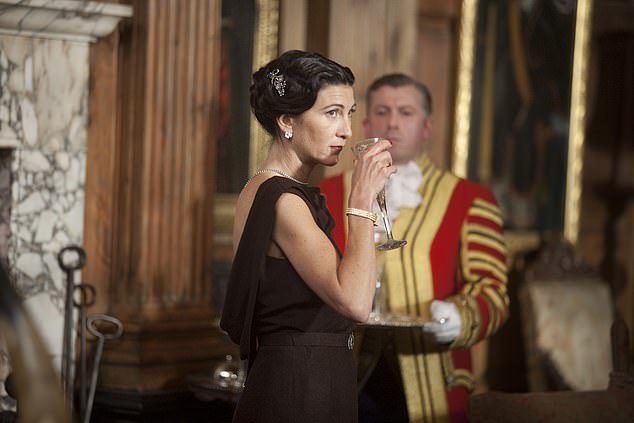
In the 2010 Oscar-winning The King’s Speech, Eve Best enshrined her as a Yankee seductress, who, cocktail in hand, turned Balmoral Castle into a jazz-age nightclub. (Pictured: Eve Best as Wallis Simpson).
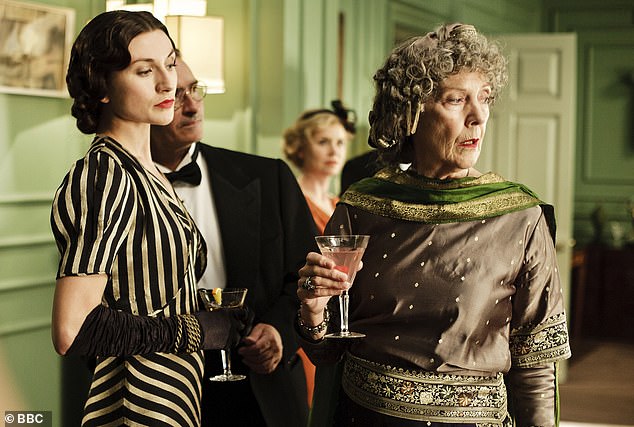
Wallis Simpson waltzed into 165 Eaton Place in London’s Belgravia in a resuscitated iteration of the famed British television series Upstairs, Downstairs. (Pictured: Emma Clifford as Wallis Simpson in Upstairs, Downstairs).
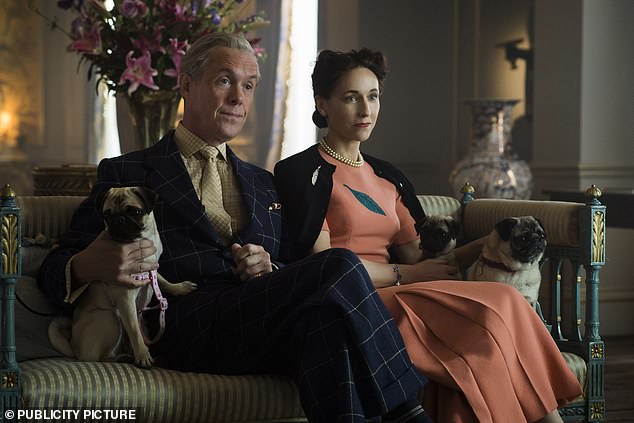
Peter Morgan’s The Crown added a touch of realism to Lia Williams’s interpretation of the much-maligned Duchess. (Pictured: Lia Williams as Wallis Simpson in The Crown).
All but comatose, unable to speak or eat, she became a pathetically reduced shadow of the woman who had once graced the pages of Vogue photographed by Cecil Beaton wearing Schiaparelli’s legendary ‘lobster dress’.
Yet even should a more historically sensitive touch be applied than I fear will be the case, I question whether this is a meaningful way to truly reconsider Wallis’s life and her not inconsequential place in the history of the modern British monarchy.
While the film will doubtlessly expose the cruel treatment that the Duchess endured from Blum, I wonder whether these revelations will still be made at the expense of Wallis, who audiences might be left to conclude was the architect of her own grim fate.
The sadness of her end at the age of 89 may yet be interpreted as just another manifestation of character flaws that have long dominated our understanding of this complex, fascinating figure – and the opportunity to create a balanced portrayal will once again, I’m afraid, be lost.
With the film still in post production, it remains to be seen whether Wallis will finally be rescued on screen from the mythology that has long defined her – or, whether, as with Meghan, she will remain shaped more by the stories told about her than by the truth she tried so hard to tell.




